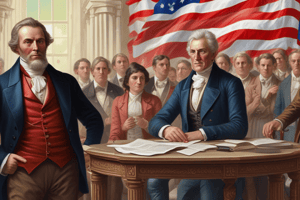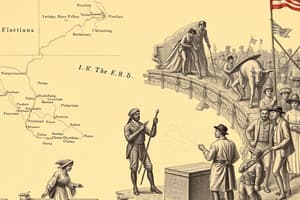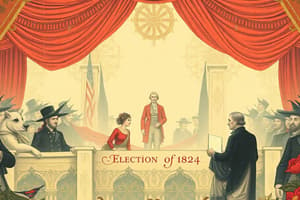Podcast
Questions and Answers
Who were the candidates in the Election of 1848?
Who were the candidates in the Election of 1848?
- Zachary Taylor
- Martin Van Buren
- Lewis Cass
- All of the above (correct)
What is Popular Sovereignty?
What is Popular Sovereignty?
The concept that political power rests with the people who can create, alter, and abolish government.
What were the main beliefs of the Free Soil Party?
What were the main beliefs of the Free Soil Party?
Distrusted both Cass and Taylor, supported internal improvements, opposed slavery, and favored free government homesteads for settlers.
What was the Wilmot Proviso?
What was the Wilmot Proviso?
What was the outcome of the Mexican War?
What was the outcome of the Mexican War?
What did the Gadsden Purchase entail?
What did the Gadsden Purchase entail?
The Compromise of 1850 included the abolition of slavery in Washington D.C.
The Compromise of 1850 included the abolition of slavery in Washington D.C.
Who was Millard Fillmore?
Who was Millard Fillmore?
What was the main issue in the Kansas-Nebraska Act of 1854?
What was the main issue in the Kansas-Nebraska Act of 1854?
What was the purpose of the Ostend Manifesto?
What was the purpose of the Ostend Manifesto?
What characterized the Twilight of the Senatorial Giants?
What characterized the Twilight of the Senatorial Giants?
Flashcards
Election of 1848
Election of 1848
Presidential election featuring Taylor, Van Buren, and Cass, ending with Taylor's victory.
Popular Sovereignty
Popular Sovereignty
The principle that citizens hold political power through voting.
Free Soil Party
Free Soil Party
Political party formed in opposition to slavery, advocating for internal improvements.
Wilmot Proviso
Wilmot Proviso
Signup and view all the flashcards
Treaty of Guadalupe Hidalgo
Treaty of Guadalupe Hidalgo
Signup and view all the flashcards
Gadsden Purchase
Gadsden Purchase
Signup and view all the flashcards
Compromise of 1850
Compromise of 1850
Signup and view all the flashcards
Kansas-Nebraska Act
Kansas-Nebraska Act
Signup and view all the flashcards
Millard Fillmore
Millard Fillmore
Signup and view all the flashcards
Stephen A. Douglas
Stephen A. Douglas
Signup and view all the flashcards
Underground Railroad
Underground Railroad
Signup and view all the flashcards
Study Notes
Election of 1848
- Zachary Taylor (Whig), Martin Van Buren (Free Soil Party), and Lewis Cass (Democrat) were the main candidates.
- Taylor's appeal as a Mexican War hero aided his popularity; he owned slaves.
- Taylor won the presidency but died in office, followed by Millard Fillmore.
Popular Sovereignty
- Concept asserting that the people hold political power.
- Allows citizens to express their political will through voting and participation.
Free Soil Party
- Emerged from dissatisfaction with both Cass and Taylor.
- Advocated for internal improvements, opposition to slavery, and free homesteads for settlers.
Wilmot Proviso
- Proposed an amendment to ban slavery in any territory acquired from Mexico.
- Passed in the House twice but failed in the Senate, highlighting intense slavery disputes.
Slavery in California
- Gold rush led to massive migrations and lawlessness in California.
- Constitution drafted in 1849 prohibited slavery, angering the South and inciting secession threats.
Mexican War
- War sparked by disputes over Texas lands; declared in 1846 by the U.S. under President Polk.
- Ended with the Treaty of Guadalupe Hidalgo in 1848, ceding vast territories to the U.S. for $15 million.
Treaty of Guadalupe Hidalgo
- Signed on February 2, 1848, cementing U.S. territorial gains of California and New Mexico.
- Established the Rio Grande as Texas's border and addressed financial claims.
Slidell Mission
- Polk's unsuccessful effort to purchase California for $25 million from Mexico.
- Mexican rejection led to heightened tensions and eventual conflict.
Gadsden Purchase
- Treaty from 1853 in which the U.S. acquired parts of southern Arizona and New Mexico.
- Aimed to facilitate a southern transcontinental railroad, showcasing sectional disagreements.
Effects of the Underground Railroad
- South demanded stricter Fugitive Slave Laws in response to runaway slaves.
- Increased feelings of inferiority among slaveholders and threats of secession.
Twilight of the Senatorial Giants
- Final appearances of key figures: Henry Clay (Fugitive Slave Laws), John C. Calhoun (maintaining slavery), Daniel Webster (Union over sectional interests).
Stephen A. Douglas
- Illinois Senator known for the Kansas-Nebraska Act and Freeport Doctrine.
- Nicknamed "Little Giant," he significantly influenced the political landscape.
Seventh of March
- Daniel Webster's notable Senate address advocating for the Union over slavery.
- Received mixed reactions, viewed as a betrayal by abolitionists.
Compromise of 1850
- Aimed to prevent civil war; included stronger Fugitive Slave Law, banned slave trade in D.C., admitted California as a free state, and introduced popular sovereignty in the Mexican Cession.
Senator William H. Seward
- New York antislavery leader; argued for a "higher law" than the Constitution regarding slavery.
Millard Fillmore
- Became president after Zachary Taylor's death.
- Played a crucial role in garnering Northern support for the Compromise of 1850.
Reasons Against War
- Economic reliance on the South and resistance to secession were key factors for the Union.
Election of 1852
- Democrats nominated Franklin Pierce; Whigs chose Winfield Scott.
- Pierce's victory was aided by Whig party divisions.
Winfield Scott
- Key military figure in the Mexican War; known as "Old Fuss and Feathers."
Franklin Pierce
- 14th President; lost Northern support after endorsing the Kansas-Nebraska Act, angering both North and South.
Clayton-Bulwer Treaty
- 1850 treaty between U.S. and Great Britain regarding the construction of a canal across Panama.
Ostend Manifesto
- 1854 declaration suggesting the U.S. might seize Cuba if Spain refused to sell it; ultimately not enacted.
Transcontinental Railroad
- Railroad planned to connect east and west coasts; debates focused on its route, favoring the North post-secession.
Kansas-Nebraska Act of 1854
- Douglas's legislation created Kansas and Nebraska, allowing popular sovereignty to determine slavery status.
- This repealed the Missouri Compromise and incited violence, known as "Bleeding Kansas."
Whigs (1852)
- Advocated for the Bank of the United States, internal improvements, and limited abolitionist views.
Democrats (1852)
- Focused on states' and individual rights, enforcing fugitive slave laws.
Omnibus Bill
- A legislative strategy to pass multiple laws as a single package; was initially introduced for the Compromise of 1850 before being broken into parts for passage.
Studying That Suits You
Use AI to generate personalized quizzes and flashcards to suit your learning preferences.




